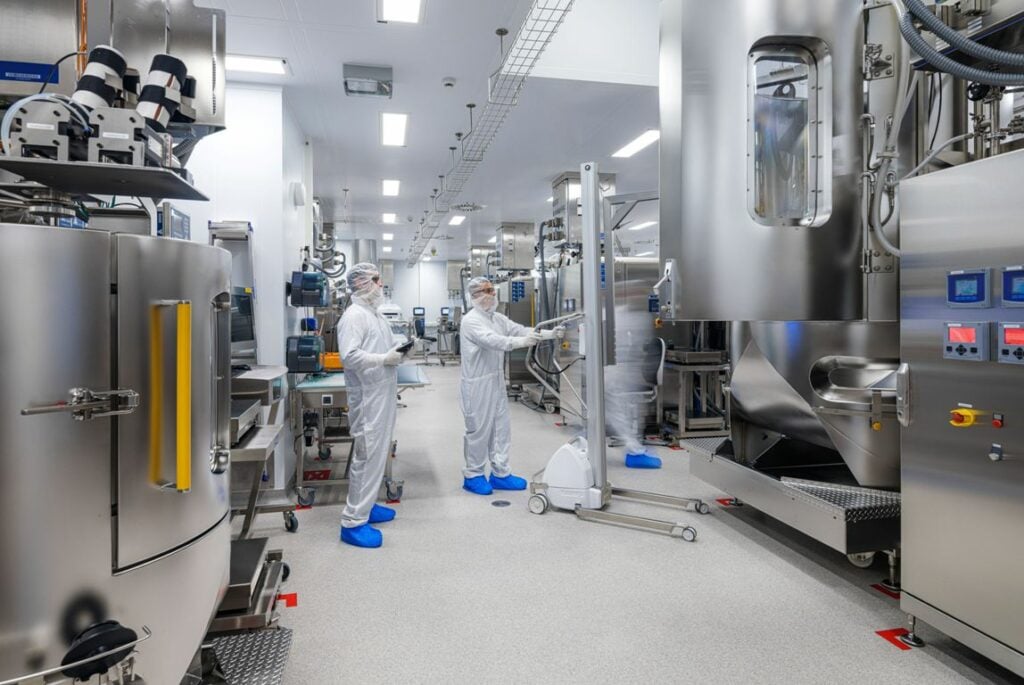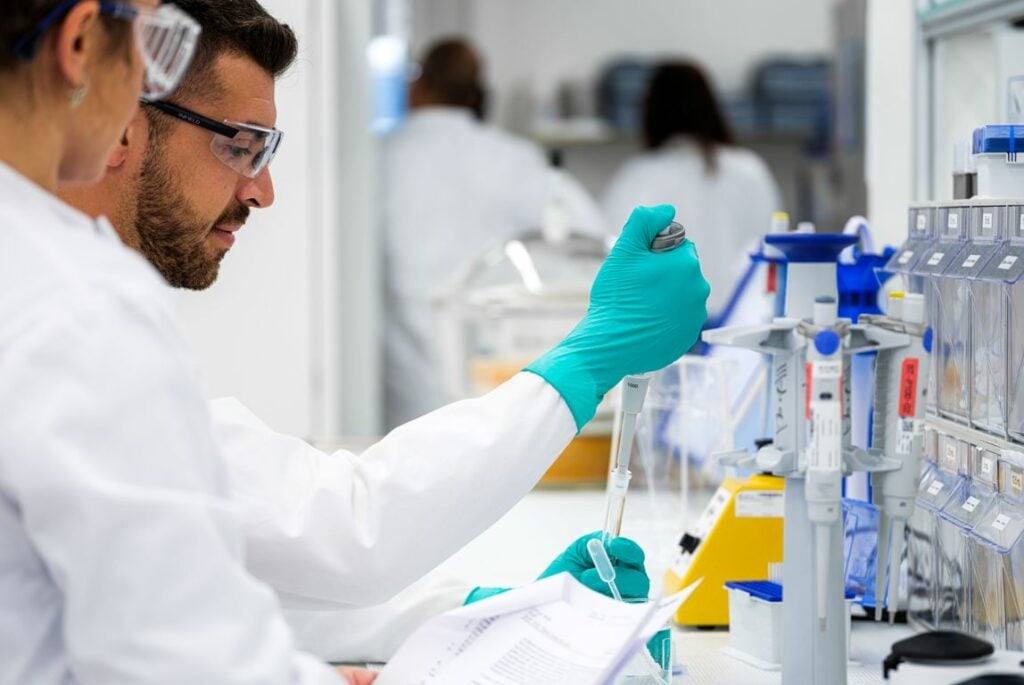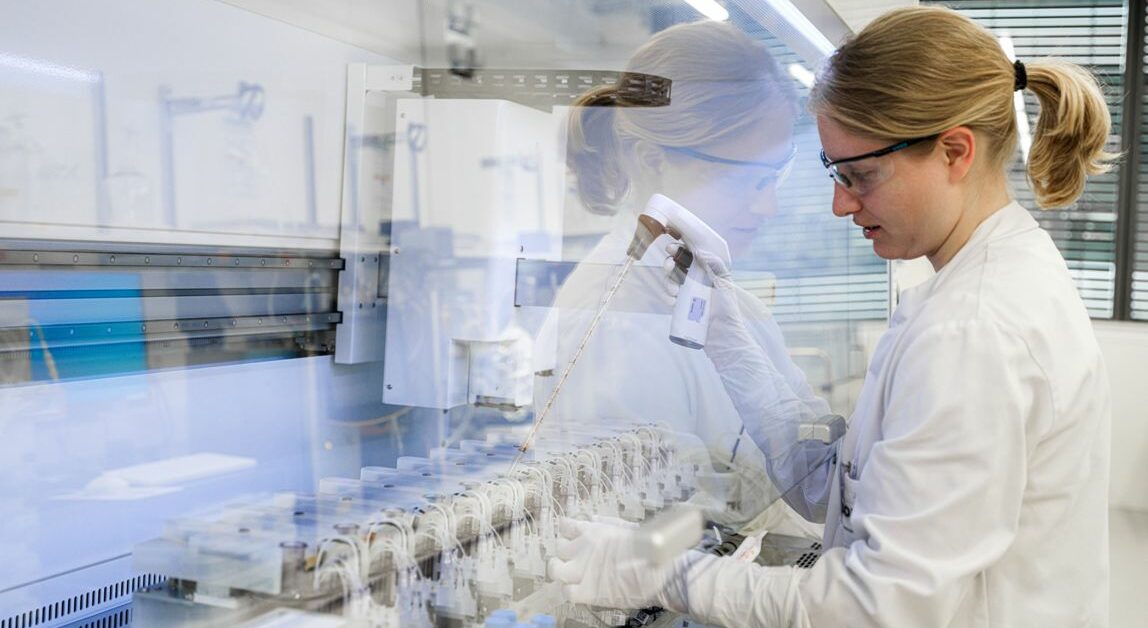Large molecule therapeutics have become increasingly prominent, as gene cloning and expression technology made routine production in living cells possible. With innovations in engineering and development technologies responding to the demand for diverse treatment options, these proteins have become more complex.
As a result, large molecule manufacturing strategies need to be tailored to ensure high product quality and to meet clinical timelines, whilst also taking into consideration individual customer needs, financial considerations and key IND milestones.
The use of protein therapeutics, also known as biologics or large molecule biopharmaceuticals, has played a central role in advancing the industry in pursuing unmet patient medical needs. Today, large molecules span a wide range of therapeutic compounds, from vaccines to hormones and growth factors, cytokines, and antibodies. Their target specificity and pronounced efficacy have set large molecules apart from more traditional small molecule medicines on the market.
Table of contents
The evolution of large molecule manufacturing
Large molecules can be manufactured using several different expression systems, including bacterial, yeast and mammalian cells, and the proteins themselves have become more complex over time.
“Mammalian cell culture-derived molecular formats have become increasingly diverse, often encompassing multiple chains and varied protein domains, presenting unique challenges for cell line, analytical and process development,” says Stuart Jamieson, Global Technical and CMC Director, Downstream Development, at Lonza Biologics Mammalian, part of the Swiss biopharmaceutical and nutrition manufacturing company Lonza Group.
As treatments continuously evolve to meet patients’ needs, life science companies require effective strategies to manufacture a range of large molecule types and swiftly move new candidates through their development programs.
The need for tailored manufacturing strategies for large molecules
Depending on their characteristics, large molecules require the manufacturing and quality control procedures to be tailored to the molecule in question.
“Compared to newer, more complex molecules, the manufacture of monoclonal antibodies is a much more mature area that uses tried-and-tested platform approaches. These have been developed over years through concerted efforts to overcome development and manufacturing challenges,” Jamieson explains.
“The challenge of advancing large molecules to clinical trials in humans faster has led us to develop a new suite of offerings which focus on reducing the time it takes to achieve investigational new drug (IND) submission,” continues Jamieson.
To address these needs, Lonza tailors programs using a combination of platform processes, advanced toolboxes and bespoke development based on the characteristics of the molecule. This panel of offerings covers a broad range of protein modalities that include antibody-based products, such as bispecific antibodies, Fc-Fusion proteins, and antibody fragments, and other recombinant proteins, such as interleukins, interferons and complex fusions.
“With novel molecular formats, more bespoke work is required. We work with all molecule types and leverage our experience and capabilities to individually tailor our programs to the needs of each large molecule,” Jamieson adds.
This approach allows challenges to be addressed early on and reduces the likelihood of problems arising later, when the costs and consequences to a drug development program are higher. Furthermore, it facilitates tailored analytical characterization and downstream processing.
“With protein purification, we can leverage our standardized platform approaches alongside customized downstream unit operations. These allow us to address the challenges presented by a specific protein,” explains Jamieson.
Adapting manufacturing strategies to the needs of each individual program in this way is essential to efficiently develop a successful product.

The importance of building a step-by-step CMC strategy tailored around key milestones
In the current biotech funding landscape, emerging and small biotechs in particular can face significant financial and time-to-market pressures while progressing their molecule to the clinic. They are often required to achieve key milestones and generate critical data before moving to the next fundraising round.
As a result, drug developers may pause their programs at strategic points to select a lead candidate to progress further, address technical challenges or secure funding.
“Customers come to us with different requirements and needs regarding their development programs,” says Alice Harrison, Global Technical Director in CMC and Analytics at Lonza Biologics Mammalian. “For example, customers may want to establish a cell line and create early material, then pause to generate additional product data and continue once additional funding is secured or critical studies completed.”
“As a result, and to gain optimal flexibility, drug developers may choose to perform activities in a phased approach. This can also be a way of de-risking the more complex molecules that may face technical challenges during development,” explains Harrison. “For instance, when a customer approached Lonza for a gene to IND package, their molecule faced several technical challenges. Moreover, some external in vitro work needed to be performed after the initial candidate was selected.”
“Additionally, the program had several key funding milestones and was therefore split into several packages: 1. Candidate selection, early formulation development and material supply, 2. Cell line development, analytical development, further formulation development and purification development. 3. Method verification/validation, non-GMP pilot batch and GMP manufacturing runs,” concludes Harrison. “This approach allowed the customer to develop their product with the flexibility they required and to commit to each stage of work as needed.”
The key role of flexible product transfer at any stage
Customers can also transfer an ongoing program to Lonza, and it is Lonza’s ability to take in a cell line at any stage of development that enables truly flexible services.
“At Lonza, we can accommodate a range of product transfer situations,” says Harrison. “We can take a pool of cells, clone and develop them, and adapt them to the Lonza process, if required, or use the customer’s existing process. We can also take in an established, but suboptimal, clonal cell line, and develop the upstream process to improve either product quality, productivity or both.”
“When a customer transfers a commercial or later phase manufacturing process, we perform a GAP analysis to see how it fits in within the Lonza facilities. This helps us best adapt Lonza’s services to the customer’s process,” explains Harrison. “In these cases, we might make minimal modifications to the process.”
To best meet a client’s needs, Lonza adapts its development and manufacturing services on a case-by-case basis using customer focused solutions.
“For example, a customer transferred a pool of cells to Lonza to establish bespoke purification and analytical methods,” says Harrison. “The pool was also used to assess the upstream platform fit. Furthermore, the customer was able to produce clonal cell lines for GMP activities as well.”

The crucial importance of an integrated program design for speed to clinic
Whilst funding decisions and the desire for a phased approach suits many complex molecule programs, for others speed to clinic is the key focus of development.
The drug development journey can be lengthy, arduous, resource straining and carries a high risk of attrition. When it comes to more complex molecular formats, such as bispecific antibodies, Fc-fusion and other recombinant proteins, these hurdles are even more pronounced.
To overcome these challenges, Lonza offers bespoke integrated drug substance and drug product programs for any type of large molecule. These services draw upon over 35 years of the company’s knowledge and experience in antibody manufacturing to simplify, integrate and accelerate more complex molecule development.
Strategies include using in silico tools to de-risk development upfront, integrating genes into highly active regions using Lonza’s GS piggyBac® transposon system, using material derived from stable pools of cells for purification and analytical development, and the industry standard GS Xceed® expression system for faster development timelines with minimized risk.
Lonza’s approaches offer clients competitive timelines, with monoclonal antibodies going from DNA transfection to IND application in only 11 months. For bispecific antibodies, the timeline is 13 months, and even the most complex proteins can be delivered within 15 months.
“For example, Lonza helped a customer with their integrated, accelerated bispecific antibody offering for a molecule that was known to be highly hydrophobic,” says Jamieson. “Based on the molecule’s known characteristics, Lonza proposed and developed a bespoke purification strategy.”
“The additional work involved screening capture resin wash and elution conditions, as well as a DoE study for choosing appropriate polishing conditions for the molecule,” Jamieson describes. “Lonza completed the development of the tailored purification process within the accelerated timeline of 13 months for bispecific antibodies.”
Lonza’s approach to large molecule manufacturing
For large molecules, each journey to the clinic is unique. Building an optimal path to turn a large molecule into a successful biological product requires risk to be balanced with time and costs.
Lonza Biologics Mammalian leverages its long standing expertise with flexibility to create bespoke manufacturing programs for any molecule type. Working with Lonza allows customers to create customized CMC strategies, transfer cell lines at any stage of development, and accelerate timelines to meet every large molecule’s needs.
See how Lonza’s flexible and tailored approach can support your large molecule manufacturing needs.
Images courtesy: Lonza Group





